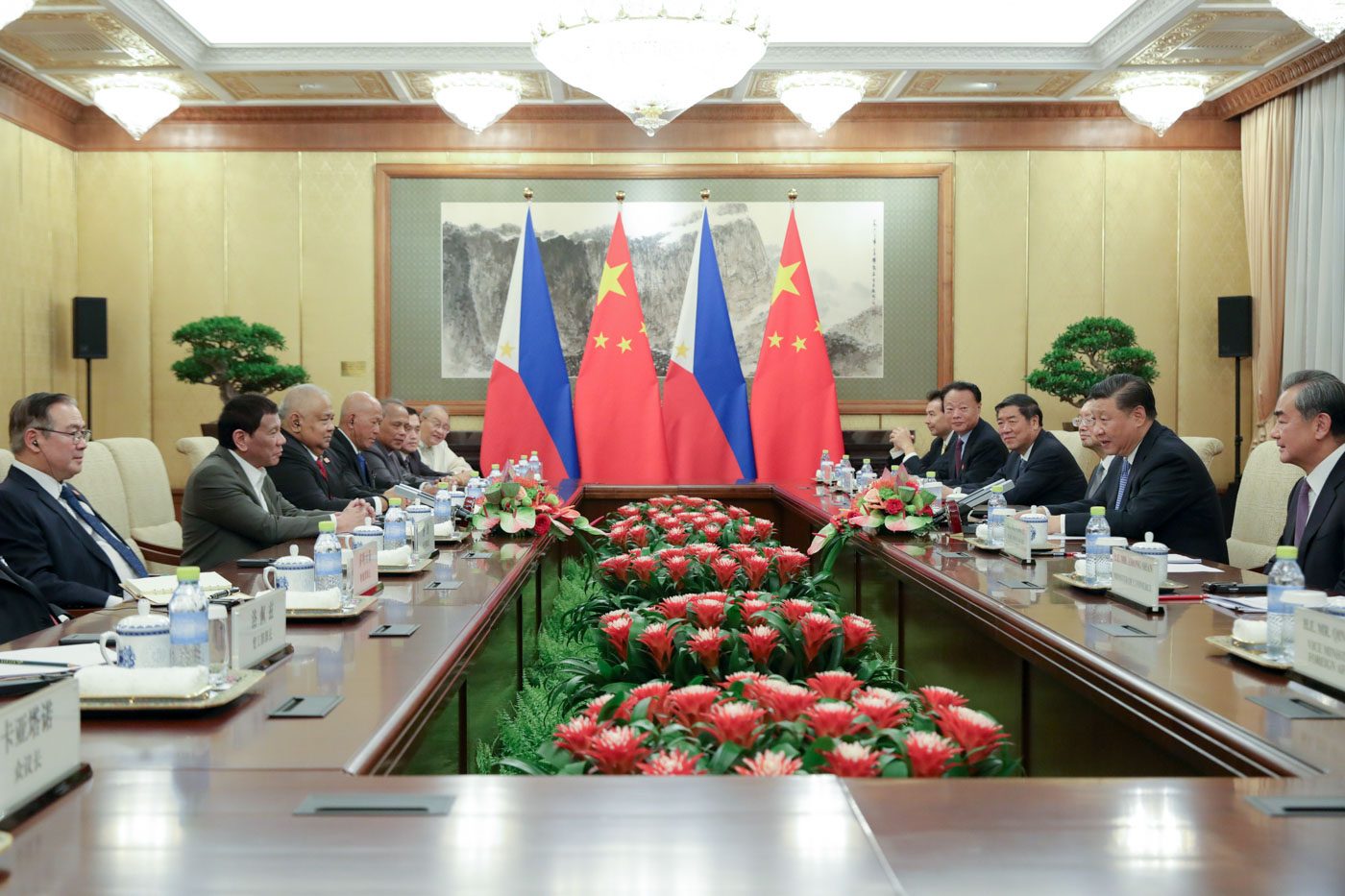SUMMARY
This is AI generated summarization, which may have errors. For context, always refer to the full article.

MANILA, Philippines – Chinese President Xi Jinping cited international law when Philippine President Rodrigo Duterte brought up warship incursions during the two leaders’ meeting in Beijing on August 29, Defense Secretary Delfin Lorenzana said.
“The reply of President Xi is that international law does not require ships passing through territorial waters of another country,” Lorenzana said in a message to reporters on Wednesday, September 4.
Asked if he meant Xi said international law does not require such ships to ask permission, Lorenzana said, “Yes. Does not require permission.”
Presidential Spokesperson Salvador Panelo earlier said Duterte expressed “deep concern” over recent unauthorized passage of Chinese naval and survey ships through Philippine waters during his meeting with Xi.
Duterte then asked Xi that Chinese warships notify Philippine authorities prior to their passage, which should be “innocent,” that is, taking the quickest way through and without any activity besides crossing.
“I would like all vessels entering our domain to fully comply with the law. Keeping radio communication channels open and active, and acknowledging our attempts at contact are crucial. Otherwise, such activities run counter to our efforts at managing the South China Sea issue,” Duterte told Xi, according to Panelo.
Although Xi gave an indirect answer – citing international maritime law – Lorenzana said the Chinese leader “reassured [President Duterte] that their naval ships are not coercing or targeting the Philippines.”
China, Western powers
Meanwhile, at the budget hearing of the Department of Foreign Affairs at the House of Representatives in Quezon City on Wednesday, Foreign Secretary Teodoro Locsin Jr told a panel of lawmakers that China had expressed willingness to ask permission from Philippine authorities for its ships’ passage.
“When Chinese warships were seen in the West Philippine Sea, the President said, ‘I will not allow that.’ And he did that, and he said I will demand permission before that happens,” Locsin said.
“And to our surprise, China’s answer was, ‘That’s exactly what we want, to ask permission.’ The problem was this: Western naval powers do not, as a matter of principle, ever ask permission because they insist on total and absolute freedom of navigation,” he added.
Noting that legal experts have yet to issue a definitive interpretation of what the United Nations Convention on the Law of the Sea (UNCLOS) says about warships and innocent passage through foreign states’ territorial waters, Locsin said, “The right of innocent passage seems to be absolute.”
“By China saying ‘Yes, we will ask permission,’ we are now on the side of China in the revision of UNCLOS, which is now asking for permission. China has always wanted that. So now we find ourselves on their side rather than on the other side,” Locsin added.
Reports that Chinese warships have been criss-crossing Philippine waters came to the fore after Supreme Court Senior Associate Justice Antonio Carpio revealed the passage of the aircraft carrier Liaoning through Sibutu Strait off Tawi-Tawi.
In a forum in Quezon City on July 19, Carpio criticized China’s “double standard” because it exercised innocent passage without notifying the Philippines and yet it would not allow Philippine vessels free passage in waters it claims as its territory, even in the West Philippine Sea.
The following week, Lorenzana disclosed the sightings of several other Chinese warships in Philippine waters, saying they should have sought permission.
Chinese Ambassador Zhao Jianhua had committed to telling the Chinese Navy to give prior notice of succeeding passage, Lorenzana also said on July 25, but at least one more Chinese warship was afterwards spotted passing Sibutu Strait unannounced.
The defense chief said it is customary among navies to notify a country’s government before passing through its territorial waters, even if international maritime law entitles them to innocent passage.
“The Americans, they tell us when they are passing. The Japanese. Everybody else,” Lorenzana told reporters in an interview on August 16, adding that China itself requires foreign vessels to seek its permission before passing through.
The US has repeatedly insisted on freedom of navigation and overflight in the South China Sea despite China’s protestations. Although the US cites “international law” when its Navy patrols the sea lane, it is not a signatory to UNCLOS, as Locsin recently pointed out in a forum in Quezon City. – Rappler.com
Add a comment
How does this make you feel?
There are no comments yet. Add your comment to start the conversation.